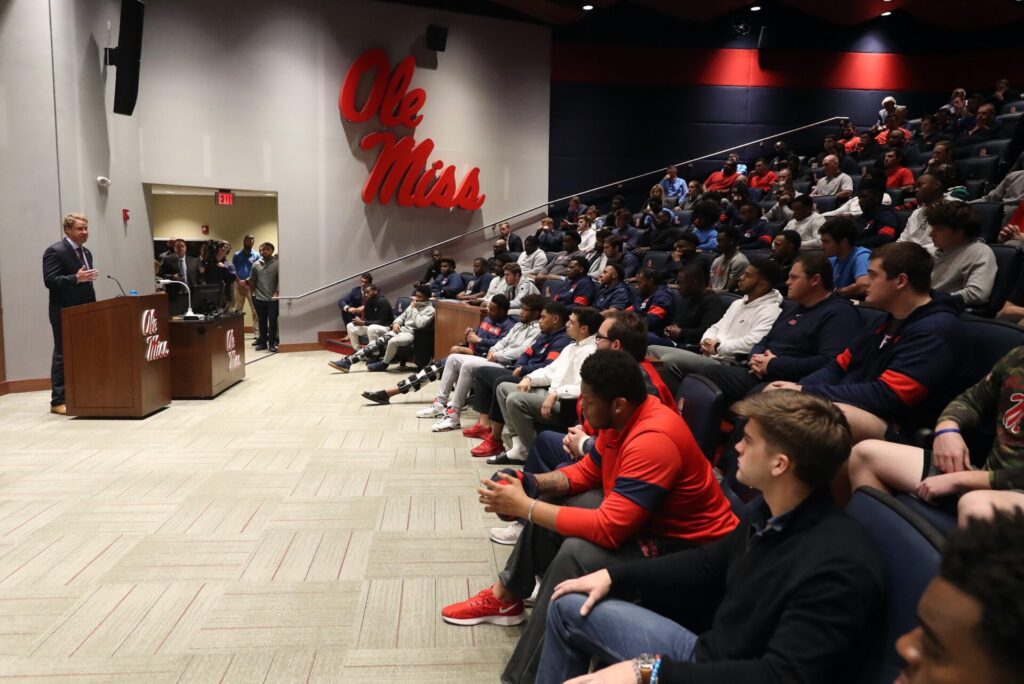Headlines
Column: With a New Head Coach in Oxford, Ole Miss-Alabama has Renewed Meaning
ESPN recently released its top 150 college football head coaches of all time in conjunction with the 150th anniversary of the sport.

Coach Lane Kiffin meets with his players. Photo by Joshua McCoy / Ole Miss Athletics.
Ole Miss’ John Vaught is on the list and fairly high at No. 44. I thought he would probably make the top 35. Records show he had a winning record of 7-6-1 in head to head matchups with the No. 1 head coach on that list – Paul Bryant.
No. 2 on the list is current Alabama head coach Nick Saban. On Oct. 3, 2020, first-year Ole Miss head coach Lane Kiffin’s team will play Saban’s.
The game’s in Oxford. Get your tickets and try not to miss it.
In the early 1970s, 40 years after the SEC began, Ole Miss ranked third all-time in conference football wins behind Alabama and Tennessee. If there was a big three in the league, Ole Miss was in it.
LSU, Auburn, and Georgia followed closely behind. Florida had never won an SEC title in football. All were charter members.
Had Vaught not retired in his early 60s, he likely would have been higher on the ESPN list. But he and Ole Miss would have had to continue to change as other programs were.
Facilities weren’t so much a problem for Ole Miss in 1970, which was the last time Vaught and Bryant met, a game the Rebels won 48-23. But not long after, that would become the case.
Two-platoon football had emerged nationally in the mid-1960s. If you hadn’t moved at least partially to that, you were falling behind. Ole Miss was falling behind. It’s one of the reasons the Rebels, ranked No. 1 in the nation, lost to an underdog Kentucky team 27-21 on a brutally hot Mississippi day in 1964.
Ole Miss’ Mike Dennis, who now lives in Oxford, told me he lost something like 12 pounds that day and never came off the field, playing both offense and defense. Kentucky had already started moving to a two-platoon system and was able to run fresh and rested players in and out of the game.
Ole Miss even had a press release explaining the Rebels weren’t moving away from one platoon just yet, that Vaught still believed in the system as it was. Certainly, Ole Miss had as much success as any program in America from the late ‘40s through the early ‘60s.
But the platoon thing contributed to the Rebels losing their No. 1 ranking that day against UK. Not until the late’60s – the Archie Manning and company years – did the Rebels seem to get back their swagger, and even then lost three games a season during that era.
In 1970, the year Ole Miss clobbered the Crimson Tide, another game has normally been given credit for changing college football’s landscape in the South. An integrated Southern Cal team of head coach John McKay, who ranks 12th on ESPN’s list, came to Birmingham and beat the Tide 42-21. The Trojans were led by an African-American named Sam Cunningham, who carried the football 12 times for 135 yards and two touchdowns.
Beyond the statistics and the score, change was coming. Not only did Bryant integrate his program, he changed to a wishbone offense during that era and won three more national titles to go along with his previous two.
Vaught stepped down after 1970, a season he didn’t complete due to health issues. Ole Miss integrated its team in 1972. Vaught returned in 1973 to coach the final eight games after Billy Kinard was fired three games into that season.
The ‘70s were not kind to Ole Miss in the win-loss column. Next door, Alabama kept on winning.
Basically, Ole Miss and Alabama were mirror programs until the early ‘70s. So Bryant is No. 1 on ESPN’s list and Vaught, with a sparkling overall record of 190-61-12, is at No. 44.
Now athletics director Keith Carter has put Ole Miss in position, with the hire of Kiffin, to have a fighting chance to move toward challenging Alabama consistently again. Crimson Tide folks would probably scoff at that.
Kiffin has reminded people it was Ole Miss which beat the Tide twice during his time in Tuscaloosa. Ole Miss almost beat Alabama all three years he was there. Bama eased out of Oxford with a 48-43 victory in 2016, or it would have been three wins in a row for the Rebels.
Perhaps Kiffin saying he didn’t come to Ole Miss to have a good program but a “great” one could be the type of confidence and work ethic the Rebels need to get back to those more consistent winning ways that almost abruptly ended in the early 1970s.
It’s a tough challenge and a different era in the sport. But things are probably going to get really interesting with recent developments in Oxford that have football people across the country talking.
 Jeff Roberson is a contributor to HottyToddy.com. He has written sports for three decades with most of that time spent at the Oxford Eagle daily newspaper and the Ole Miss Spirit magazine and website. He is the author of “Midnight Train,” the life story of former Ole Miss quarterback and Hall of Fame songwriter Jim Weatherly.
Jeff Roberson is a contributor to HottyToddy.com. He has written sports for three decades with most of that time spent at the Oxford Eagle daily newspaper and the Ole Miss Spirit magazine and website. He is the author of “Midnight Train,” the life story of former Ole Miss quarterback and Hall of Fame songwriter Jim Weatherly.





























